- Home
- Robin McKinley
The Blue Sword d-1 Page 13
The Blue Sword d-1 Read online
Page 13
Mathin's usual set grin of concentration and, she had thought recently, pride flickered a bit at her flash of attack; and he lifted his eyes briefly to her face, and even as sword met sword he … faltered.
Without thinking, for this was what she was training for, she pressed forward; and Windrider stumbled, and Sungold slammed into her, shoulder to shoulder, and her blade hit Mathin's hilt to hilt, and to her own horror, she gave a heave and dumped him out of the saddle. His shield clanged on a rock and flipped front down, so it teetered foolishly like a dropped plate.
The horses lurched apart and she gazed down, appalled, at Mathin sitting in a cloud of dust, looking as surprised as she felt. The grin had disappeared for a moment—quite understandably, she thought—but by the time he had gotten to his feet and she had slid down from Sungold's back and anxiously approached him, it had returned. She tried a wavering smile back at him, standing clumsily with her sword twisted behind her as if she'd rather not be reminded of its presence; and Mathin switched his dusty sword from his right hand to his left and came to her and seized her shoulder. He was half a head shorter than she was, and had to look up into her eyes. His grip was so hard that her mail pinched her shoulder, but she did not notice, for Mathin said to her: "My honor is yours, lady, to do with what you will. I have not been given a fall such as that in ten years, and that was by Corlath himself. I'm proud to have had the teaching of you—and, lady, I am not the least of the Riders."
The anger had left her completely, and she felt dry and cold and empty, but then as her eyes unwillingly met Mathin's she saw a sparkle of friendship there, not merely the objective satisfaction of a teacher with a prize pupil: and this warmed her more kindly than the anger had done. For here in the Hills, she, an Outlander woman, had a friend: and he was not the least of the Riders.
Lessons continued after that, but they were faster and more furious, and the light in Mathin's face never faded, but it had changed from the sturdy concentration of a teacher to the eager enthusiasm of a man who has found a challenge. The heat and strength they expended required now that they stop to rest at midday, when the sun was at its height, even though the Hills were much cooler than the central desert had been. Tsornin would never admit to being tired, and watched Harry closely at all times, in case he might miss something. He took her lessons afoot very badly, and would lace back his ears and stamp, and circle her and Mathin till they had to yell at him to go away. But during the last ten days he was content to stand in the shade, head down and one hind leg slack, at noontime, while she stretched out beside him.
One day she said, "Mathin, will you not tell me something of how the horses are trained?" They were having their noon halt, and Sungold was snuffling over her, for she often fed him interesting bits of her lunch.
"My family raises horses," said Mathin. He was lying on his back, with his hands crossed on his chest, and his eyes were shut. For several breaths he said nothing further, and Harry wanted to shout with impatience, but she had learned that such behavior would shut Mathin up for good, while if she bit her tongue and sat still, hugging her irritability quietly, he would sometimes tell her more.
He told her more this time: how his father and three older brothers bred and raised and trained some of Damar's finest riding-horses. "When I was your age," he said bleakly, "the best horses were taught the movements of war for the fineness of control necessary in both horse and rider; not for the likelihood that they should ever see battle.
"My father trained Fireheart. He is very old now, and trains no more horses, but he still carries all our bloodlines in his head, and decides which stallions should be bred to which mares." He paused, and Harry thought that was all; but he added slowly, "My daughter trained Sungold."
There was a long silence. Then Harry asked: "Why did you not stay and train horses too?"
Mathin opened his eyes. "It seemed to me that a father, three brothers and their families, a wife, daughter, and two sons were enough of one family to be doing the same thing. I have trained many horses. I go home … sometimes, so that my wife does not forget my face; but I have always wished to wander. As a Rider, one wanders … It is also possible that I was not quite good enough. None of the rest of my family has ever wished to leave what they do, even for a day. I am the only one of us for generations who has ridden to the laprun trials to win my sword."
Harry said, "Why is it that you are my teacher? Were you—Did Corlath order you?"
Mathin closed his eyes again and smiled. "No. On the day after you drank Meeldtar and saw the battle in the mountains, I spoke to Corlath, for I knew by your Seeing that you would be trained for battle. It might have been Forloy, who is the only one of us who speaks your Outlander tongue, or Innath, who is the best horseman of us; but I am older, and more patient perhaps—and I trained the young Corlath, once, when I was Rider to his father."
Forloy, thought Harry. Then it was Forloy. "Mathin—" she began, and her voice was unhappy. She was staring at the ground, plucking bits of purple grass and shredding them, and did not notice that Mathin turned to look at her when he heard the unhappiness. She had not sounded so for weeks now, and he was pleased that this should be so.
"Why—why did Forloy never speak to me, before I—before you began to teach me to speak your tongue? Does he hate Outlanders so much? Why does he know the—my—language at all?"
Mathin was silent as he considered what he could tell his new friend without betraying his old. "Do not judge Forloy—or yourself—too harshly. When he was your age, and before he was a Rider, Forloy fell in love with a woman he met at the spring Fair in Ihistan. She had been born and raised in the south, and gone into service to an Outlander family there; and when they were sent to Ihistan, she went with them. The second year, the next Fair, he returned, and she agreed to go to the Hills with him. She loved Forloy, I think; she tried to love his land for his sake, but she could not. She taught him Outlander speech, that she might remember her life there by saying the words. She would not leave him, for she had pledged herself to live in the Hills with him; but she died after only a few years. Forloy remembers her language for her sake, but it does not make him love it." He paused, watching her fingers; they relaxed, and the purple stems dropped to the earth. "I do not believe he had spoken any words of it for many years; and Corlath would not have asked it of him for any less cause."
Corlath, Harry thought. He knows the story—of the young foreign woman who did not thrive when she was transplanted to Hill soil. And she was Darian born and bred, and went willingly. "And Corlath? Why does Corlath speak Outlander?"
Mathin said thoughtfully, "Corlath believes in knowing his … rivals. Or enemies. He can speak the Northern tongue as well, and read and write it, and Outlander, as well as our Hill tongue. There are few enough of us who can read and write our own language. I am not one of them. I would not wish to be a king."
There were only a few days left to run till the laprun trials. Mathin, between their more active lessons, taught her more of the Hill-speech; and each word he taught her seemed to awaken five more from where they slept in the back of a mind that was now, she had decided, sharing brain space and nerve endings with her own. She accepted it; it was useful; it permitted her to live in this land that she loved, even if she loved without reason; and she began to think it would enable her in her turn to be useful to this land. And it had won her a friend. She could not take pride in it, for it was not hers; but she was grateful to it, and hoped, if it were kelar or Aerin-sol's touch, that she might be permitted to keep it till she had won her right to stay.
With the language lessons Mathin told her of the Hills they were in, and where the City lay from where their little valley sat; and he told her which wood burned best green, and how to find water when there seemed to be none; and how to get the last miles out of a foundered horse. And her lessons of war had strengthened her memory, or her ability to draw upon that other memory, for she remembered what he told her. And to her surprise, he also told her the names
of all the wildflowers she saw, and which herbs could be made into teas and jams; and these things he spoke of with the mild expression on his face that she had seen only when he was bending over his cooking-fire; and even these things she learned. He also told her what leaves were best for stopping blood flowing, and three ways of starting a fire in the wilderness.
He looked at her sidelong as he spoke about fire-making. "There's a fourth way, Hari," he said. "Corlath may teach it to you someday." There was some joke here that amused him. "Myself, I cannot."
Harry looked at him, as patiently as she could. She knew that to question him when he baited her like this would do her no good. Once, a day or two after Mathin's unexpected fall, she had let a bit more of her frustration show than she meant to, and Mathin had said, "Hari, my friend, there are many things I cannot tell you. Some I will tell you in time; some, others will tell you; some you may never know, or you may be the first to find their answers."
She had looked across their small fire at him, and over Narknon's head. They were both sitting cross-legged while the horses grazed comfortably not far away, so that the sound of their jaws could be heard despite the crackling fire. Mathin was rewiring a loose ring on his chain-encrusted vest.
"Very well. I understand a little, perhaps."
Mathin gave a snort of laughter; she remembered how grim and silent she'd thought him, he in particular of all the king's Riders. "You understand a great deal, Harimad-sol. I do not envy the others when they see you again. Only Corlath truly expects what I will be bringing out of these Hills."
This conversation had made it a little easier for her when he slyly told her of things, like the fourth way of lighting fires, which he refused to explain. She didn't understand the reasons, but she was a bit more willing to accept that a reason existed. It surprised her how much he told her about himself, for she knew that he did not find it easy to talk of these things to her; but she understood too that it was his way of making up, a little, for what he felt he could not tell her. It also, as he must have intended, made her feel as if the Hillfolk were familiar to her; that her own past was not so very different from theirs; and she began to imagine what it would have been like to have grown up in these Hills, to have always called them home.
One of the things Mathin would tell her little of was Aerin Dragon-Killer and the Blue Sword. He would refer to Damar's Golden Age, when Aerin was queen, but he would not tell her when it was, or even what made it golden. She did learn that Aerin had had a husband named Tor who had fought the Northerners, for the Northerners had been Damar's enemies since the beginning of time and the Hills, and every Damarian age had its tale of the conflict between them; and that King Tor was called the Just.
"It sounds very dreary, being Just, when your wife kills dragons," said Harry, and while Mathin permitted himself a smile, he was not to be drawn.
She did pry something else out of him. "Mathin," she said. "The Outlanders believe that the—the—kelar of the Hills can cause, oh, firearms not to fire, and cavalry charges to fall down instead of charging, and—things like that."
Mathin said nothing; he had marinated cut-up bits of Narknon's latest antelope in a sharp spicy sauce and was now frizzling them on two sticks over the low-burning fire. Harry sighed.
Mathin looked up from his sticks, though his fingers continued to twist them slowly. "It is wise of the Outlanders to believe the truth," he said. He dug one stick, butt-end, into the ground, and thrust his short knife into the first chunk of meat. He nibbled at it delicately, with the concentrated frown of the artist judging his own work. His face relaxed and he handed Harry the stick still in his other hand. But he spoke no more of kelar.
Mathin took no more falls, and by the middle of the sixth week Harry felt she had forgotten her first lessons because they were so far in the past. She could not remember a time when the palm of her right hand did not bear stripes of callus from the sword hilt; when the heavy vest felt awkward and unfamiliar; nor a time when she had not ridden Tsornin every day.
She did remember that she had been born in a far green country nothing like the kelar-haunted one she now found herself in; and that she had a brother named Richard whom she still called Dickie, to his profound dismay—or would, if he could hear her—and she remembered a Colonel Jack Dedham, who loved the Hills even as she did. A thought swam into her mind: perhaps we shall meet again, and serve Damar together.
On the fourth day of the sixth week she said tentatively to Mathin: "I thought the City was over a day's journey from here."
"You thought rightly," Mathin replied; "but there is no need of your presence on the first day of the trials."
She glanced at him, a little reassured, but rather more worried.
"Do not fear, my friend and keeper of my honor," said Mathin. "You will be as a bolt from the heavens, and Tsornin's flanks shall blind your enemies."
She laughed. "I look forward to it."
"You should look forward to it," he said. "But I, who know what I will see, look forward to it even more."
CHAPTER EIGHT
On the seventh day they left their valley. Harry felt a little sad, although she thought a bit of her nostalgia was apprehension for the future.
Just before they mounted, Mathin came and stood before her, with a long piece of maroon silk in his hand. Harry was wearing a long side-slashed red tunic over long full trousers of the same color, and a dark blue surcoat; she was accustomed to Hill dress now, and comfortable in it, unlike her first evening in the king's camp.
"Put this on, so," said Mathin. He gestured to his own waist; he wore a dark green sash. She looked down at herself. Mathin tossed the maroon strip over his shoulder, and pushed her hands away from her sides. He untied the brown cord she had used as a belt and dropped it as if it were trash, and wound the maroon silk twice around her waist, and tucked the ends of it away in some invisible fashion. She looked up: Mathin was wearing the fierce grin she was accustomed to seeing when they crossed swords. "One of the Hills must have a sash when she goes to the laprun trials, where it will be proved that she deserves to wear it." He turned away to mount Windrider.
Harry stood where she was a moment longer, feeling where the sash seized her lower ribs as she breathed. Then she put her hands on the pommel and cantle of the saddle and vaulted onto Sungold's back as she could now do easily; she had begun to consider if she could learn Corlath's way of mounting, which did not seem to require the use of the hands.
They jogged along steadily all that day, although the pack horse was inclined to complain. It had had a soft six weeks and was not entirely equal—even with its burdens much lighter than they had been six weeks before—to keeping pace with the flint-hard war-horses. Narknon loped along beside them, dashing off into the bushes occasionally on her private business, reappearing silently ahead of them, waiting by the trail for them to catch her up. They paused for lunch and a cold supper; but they continued on in the twilight. After the sunset was gone, Harry could see a glow in the northeast.
"It is a great bonfire on the plain before the City, to mark the opening of the trials tomorrow at dawn," Mathin told her. Harry wondered if any of the other trials riders were seeing things in the flames.
Her mind wanted to feel nervous and restless that night, but her well-trained body and that extra whatever-it-was sent her off to sleep before she had time to argue. At dawn when the trials were beginning, they were in the saddle again, riding easily and listening to the breeze, Harry half expecting to hear the distant clash and yell of combat. Slowly they rode all that day, that they might not arrive tired. The pack horse had given up complaining, and marched on resignedly.
They rode around the edge of a gaunt grey rockface at sunset and suddenly before her was a vast field, the Hills rising sharply at its perimeter. The plain was speckled with fires, and in the swiftly falling shadows she could make out the many-legged shapes of huddled horses and huddled men, and the angular silhouettes of tents. There were too many of them; her heart jumpe
d out of its usual location and began beating frantically against the base of her throat. She raised her eyes to the watching Hills again: surely this great flat plain was not a natural phenomenon in this rugged land? And yet what labor could have flattened the Hills so?
Mathin was staring across the fires as if he would recognize the owners of the dark featureless tents even from here. She thought with his long eyes he might succeed. "Mathin, do you know how this plain came to be—has it always been here?"
Mathin, still looking out over the plain, said, "There is a story that Tor met the Northerners on this plain, and held them away from the City for nine days, and the heat of that battle melted the rocks of the Hills, which made a pool; and when the pool became hard again, it was this plain."
"What happened on the tenth day?" asked Harry. But Mathin put Windrider into a trot without answering. Sungold trotted obediently behind her, his ears pricked stiffly at the scene before him. He was ready for anything Harry might ask him to do; he gave her a little confidence. But the other riders here had known of the laprun trials perhaps all their lives; perhaps they had been training for them nearly as long.

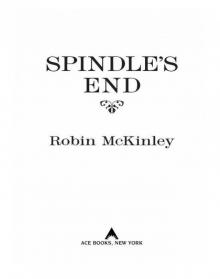 Spindle's End
Spindle's End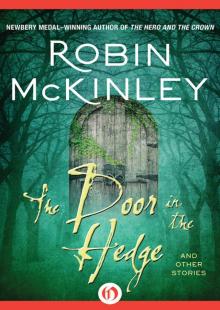 The Door in the Hedge: And Other Stories
The Door in the Hedge: And Other Stories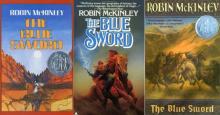 The Blue Sword
The Blue Sword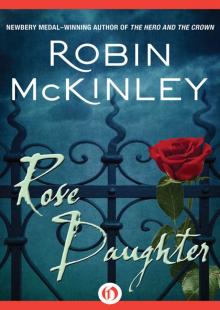 Rose Daughter
Rose Daughter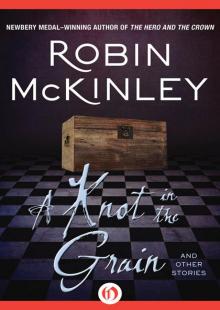 A Knot in the Grain and Other Stories
A Knot in the Grain and Other Stories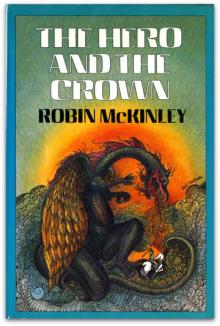 The Hero And The Crown
The Hero And The Crown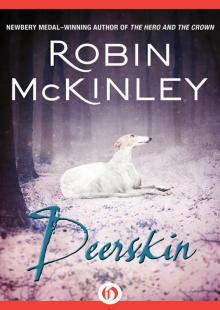 Deerskin
Deerskin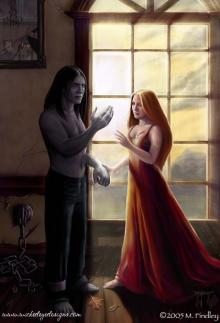 Sunshine
Sunshine Beauty: A Retelling of the Story of Beauty and the Beast
Beauty: A Retelling of the Story of Beauty and the Beast Shadows
Shadows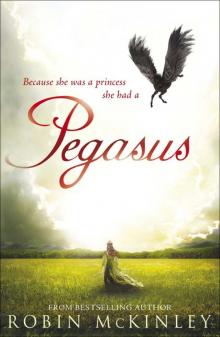 Pegasus
Pegasus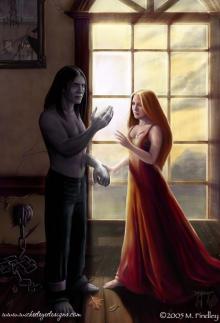 Chalice
Chalice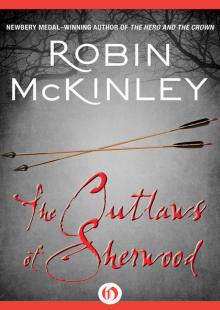 The Outlaws of Sherwood
The Outlaws of Sherwood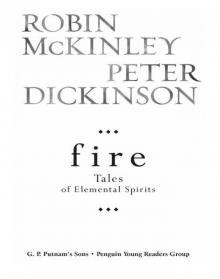 Fire: Tales of Elemental Spirits
Fire: Tales of Elemental Spirits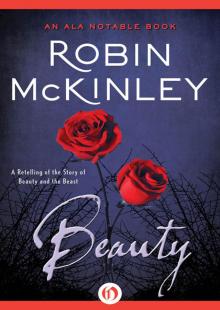 Beauty
Beauty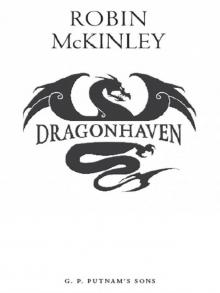 Dragon Haven
Dragon Haven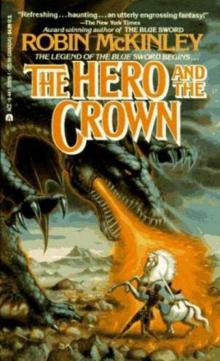 The Hero And The Crown d-2
The Hero And The Crown d-2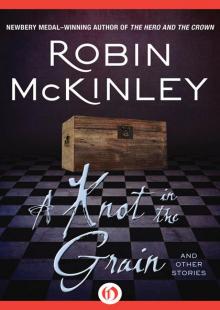 A Knot in the Grain
A Knot in the Grain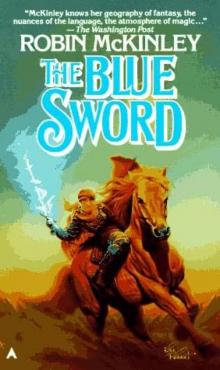 The Blue Sword d-1
The Blue Sword d-1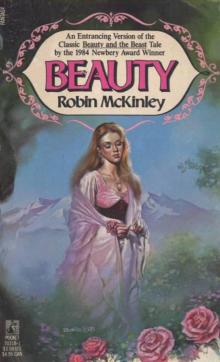 Beauty (v1.2)
Beauty (v1.2)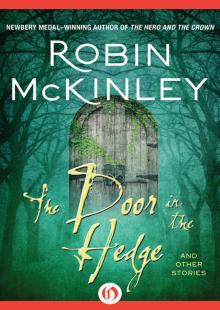 The Door in the Hedge
The Door in the Hedge